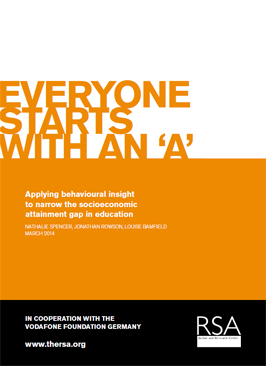“Imagine a classroom where everyone started off an academic year with an “A” grade, and in order to keep the grade, a pupil had to show continuous improvement throughout the year.
In this classroom, the teacher would have to dock points from a pupil’s assessment when his or her performance or achievement was inadequate, and pupils would work to maintain their high mark rather than to work up to it. How would this affect effort, expectations, performance, and assessment relative to current practice?”
This is one of the questions we pose in our report Everyone Starts with an A, which explores the application of behavioural insight to educational policy and practice.
Using research from behavioural science and our evolving understanding of human nature, we explore how effort, motivation, learning enjoyment, resilience, and overall performance at school can be influenced in ways not often traditionally recognised.
Connecting theory to practice
Supported by the Vodafone Foundation Germany, this report is intended to start a conversation among educators. It includes practical tips to help connect theory to real-life practice in the classroom. We hope that practitioners will continue the discussion started here by trialling the tips and techniques in their own schools and sharing their experiences with peers and colleagues. German speaking educators are encouraged to visit the Lehrerdialog website to share their experiences of working with the practical tips offered in the report.
We cover three concept areas specifically:
- Growth mindsets: the belief that intelligence and ability are not a fixed and innate trait, but rather they can be improved and strengthened through effort and practice.
- Cognitive biases: our thinking patterns can have systematic influence on motivation, evaluation, and teacher and pupil expectations about performance.
- Surroundings: the physical environment of the classroom can affect various cognitive and non-cognitive skills - such as attention levels and self-control - which are important for learning.
We believe that these three points are promising areas for further research. An improved understanding of how these concepts affect pupil learning might be especially valuable to disrupt patterns of assumption about performance levels, for those who self-identify as being part of a stigmatised group, such as those from a low socioeconomic background.
pdf 393.6 KB
Contributors




Be the first to write a comment
Comments
Please login to post a comment or reply
Don't have an account? Click here to register.